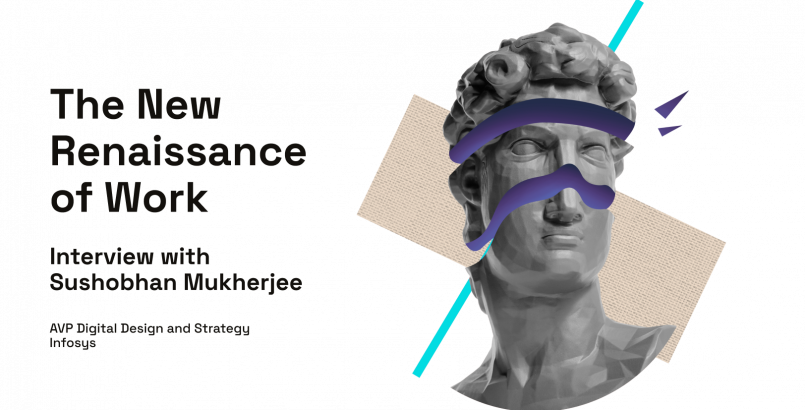Our guest, Sushobhan Mukherjee, is the AVP (Digital Design and Strategy) at Infosys, and a globally renowned strategist. He is responsible for digital transformation, branding as well as communications in various business initiatives. He was a co-founder of Dealstreetasia.com which was acquired by The Financial Times.
Sushobhan Mukherjee discusses changing work patterns with Agnieszka Porębska, VP, External Relations in Talent Alpha. Agnieszka is also the Editor-in-Chief of the Future of Work Report published annually by Talent Alpha and its partners.
Agnieszka Porebska
You are deeply involved with the tech industry and you know a lot about its people challenges.What’s your take on how serious the tech talent gap issue is, and how much it will impact the future of work?
Sushobhan Mukherjee
That’s a very interesting question because technology is not a fixed thing. It is evolving really, really fast. Intangibles dominate the global economy, and progress across industries is now based on software and intellectual property rather than land, plants or machinery. So, skill sets need to change very quickly to remain relevant.
Think about a metaphor. Imagine, you have trained to be a sushi chef. On a daily basis, you make a living off of the skills you have mastered. Then, one day, when you come into work, you are shocked to realize that your customers do not want to have sushi anymore. Now they want pierogi. Then you start to think: “I have never rolled pierogi in my life. I have no idea how to do it. I’m a sushi chef.”
The future of work, as in the restaurant metaphor, demands a different type of worker, one who can adapt to changing requirements and be ready for what will emerge tomorrow. How do we adapt to this change? As an aside, the film Jiro Dreams of Sushi is the perfect philosophical inspiration for achieving excellence in craft.
All companies have to wake up to the fact that the work of today is not going to be the future of work. The reason is, people are demanding different things, and there are also so many things that people don’t know they need. However, businesses will need to grow and pivot, and employees have to deliver. Think about Facebook becoming Meta and web3 dominating the conversation, soon creating a groundswell of demand. So talent gaps will always be present. The consistent challenge for companies will be to attract competent workers, with the ability to be nimble, and the curiosity to master the next new thing.
Agnieszka Porebska
How can we predict what skills will be needed in the future and how the recruitment processes will change?
Sushobhan Mukherjee
I am lucky to be working at the cusp of healthcare and digital transformation, so I am in touch with ideas from doctors and engineers. Every day, I am astounded by the mathematical and engineering skills of doctors. The stereotype of mathematics being the domain of engineers and not doctors is one that was rife when I was in school. Now, if a doctor is not able to use AI and ML to their advantage, they will be left behind by those who will seize the future via technology.
Across human history, and no one theorized it better than Joseph Schumpeter in his ‘Theory of Creative Destruction’, whenever an opportunity emerges, someone will come and fill the gap created by it. What I am talking about here is not just about being competent. It’s about being ahead of the curve in the times to come.
For organizations, it is a different challenge. Good organizations traditionally have also been strong brands for all their stakeholders, because they have a promise to fulfill that they have to keep adding to, and delivering towards, day in day out. Part of that branding experience is being a good employer brand which has largely meant “You help grow my company and I’ll help you develop your career”. It is an implicitcommitment of the employer to the employees: “We will keep you employed”. This is about the staff that companies already have. According to the theme of changes, there is one question organizations frequently fail to answer: “How do I get new blood in?”.
Most recruitment systems were designed when the world was about stability, workers could dream of lifetime employment and there was a clear hierarchy of preferred places to work. The future of work and the A3 Revolution, meaning working from Anywhere, Anyplace, Anytime, is about adding new skills at a much faster pace than we are accustomed to. Going big on training alone will not help deliver speed, one has to innovate on multiple fronts to succeed.
These are the changes that have to occur in the employees themselves, because overall, it is a dynamic world. What do you really need today? What will emerge tomorrow? We honestly must react very fast rather than predict, because predictions may well be off the mark.

Agnieszka Porebska
What are the most pressing talent challenges that companies need to face at the moment?
Sushobhan Mukherjee
The business of talent is going through a major rebalancing of power, with employees asserting themselves stronger than ever before. Talent Acquisition, which reflects a mentality of abundant talent chasing scarce jobs, is now giving way to Talent Attraction, where scarce talent is being wooed to join and to continue to work with that organization.
The digital transformation in talent seems to be about employees behaving like customers who can return a product they do not like and buy another one. It might seem fickle if you are a recruiter, but if one has rare expertise, why must one keep at something that is not a good fit, doesn’t have an encouraging environment or has limited opportunities for growth? Is project or task-based employment where this is all going?
Digital transformation is about giving businesses the same tools that consumers work with. Furthermore, it means looking at innovation not at the level of an organization, but at the level of entire populations and the ways their different components interact with each other. but at the level of populations. In this way, innovation can be viewed as a set of inter-community relationships. It can be learning from other industries, or building solutions in one area and applying it in another.
Perhaps we can learn from e-commerce. Is an extended trial period, let’s say three months, going to help? What about an Apple Care-like warranty, one that provides upgrades to one’s skills? What does that look like? Will it be provided by a university, or by a training organization?
Agnieszka Porebska
I would like to talk more about the A3 Revolution, as well as, democratizing the way we work and recruit talent from all over the world. Do you think that the movement of openness that Covid has had a hand in, will help to build an innovative mindset?
Sushobhan Mukherjee
The short answer is yes. Companies developed as geographical talent pools. In the past, employees had to go to the factory because this was the place where the tools were. Today my tools are bits and bytes, and I can access them from anywhere thanks to remote working. This is the way I translate my talent into a productive endeavor that does not need geography. Geography is History.
I look at history, specifically the Renaissance period, to understand the future of work. Then, talented artists and scholars moved from court to court, travelling with their tools, creating masterworks wherever they were commissioned. Also, if we look back 200 years, at the dawn of the Industrial Age, there were people who took their tools and went from place to place looking for work. But as the Industrial Age progressed, it anchored people to their places of work. Perhaps that is the aberration? In this sense, history is repeating itself. Only now you can take your digital device and work remotely, wherever you may be geographically, your talent and digital tools move across the metaverse.
Throughout the A3 Revolution, skills do not always address demand. They aren’t easily identifiable in talent pools, and you have to look in various places to identify specific skills. In order to do that, you should transform your recruitment and selection processes and have a strategy for the short, the medium, and the long term.
Demand is fragmenting at a very rapid pace, with needs evolving much faster than individual skills can develop. To keep pace, companies themselves need to look for talent in many places – whether they are from another industry, academia, a different geography. They have to go wherever talent resides, which is not always in the vicinity of the workplace.
Covid has widened and exposed the fault lines in the employer-employee compact. For employees, if one can work from anywhere, or reduce long commutes, while retaining their pay and benefits, why not? For employers, if an employee is working remotely from a lower cost location, should they be compensated commensurately lower?
We have seen the implicit contract change from presenteeism to remote productivity to concrete outcomes, perhaps time is ripe to make outcomes explicit, and tied to skills? That begins to look more like gig work, or if you prefer, Renaissance work.


Read also
Future of Work 2021/2022 report is released
The annual Future of Work report produced by Talent Alpha is now available for download.
Webinar: The Human Cloud: Your secret weapon in the War for Tech Talents
On November 18th, Talent Alpha had the pleasure of hosting a webinar: The Human Cloud: Your secret weapon in the War for Tech Talent.
The Human Cloud Ecosystem - Re-Shaping the Business World
Although cloud service was already on the rise before the pandemic, it wasn’t a necessity for many of the people in the industry. What has changed since then?